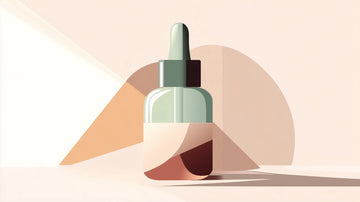Menopause brings about major hormonal changes, notably a decrease in estrogen levels, which affect the body's ability to retain water. This can cause symptoms such as dry skin, fatigue, joint discomfort, or cognitive issues. Good hydration helps to:
- Reduce hot flashes by regulating body temperature.
- Preserve skin health by maintaining its elasticity and preventing dryness.
- Enhance cognitive function and mood thanks to improved brain hydration.
- Support joints and bones by facilitating synovial fluid production and mineral absorption.
Practical Advice
- Drink 1.5 to 2 liters of water per day, adjust according to your physical activity or the climate.
- Consume water-rich foods such as cucumber and watermelon.
- Limit coffee and alcohol, which can worsen dehydration.
- Manage night sweats with breathable textiles and proper hydration.
Adopting these habits can alleviate symptoms and improve your overall well-being during this transitional period.
How hydration affects menopause
Hormones and water balance
Estrogens play a key role in managing the body's water balance. Their decline during menopause disrupts this regulation, making it more difficult for the body to retain water. This hormonal change may increase the risk of dehydration, as the body becomes less efficient at managing fluctuations in its hydration level.
This explains why many women experience a more pronounced thirst during this period. These changes require special attention to maintain a proper level of hydration.
Symptoms of dehydration
During menopause, dehydration can manifest itself through various symptoms:
| Symptom | Observed effects |
|---|---|
| Dry skin | Skin that is less supple, more fragile |
| Fatigue | Lack of energy, difficulty concentrating |
| Joint discomfort | Stiffness and more frequent pain |
| Cognitive disorders | Memory and concentration problems |
Hydration and hot flashes
Maintaining proper hydration helps regulate body temperature, which can lessen the intensity of hot flashes.
Some practical advice for better managing these symptoms:
- Drink small amounts of water throughout the day.
- Prefer water at room temperature.
- Reduce the consumption of coffee and alcohol.
Customized approaches, such as those provided by Laboratoires üma, can offer solutions tailored to these specific needs.
Benefits of hydration during menopause
Skin health and elasticity
Staying well hydrated helps maintain skin firmness by supporting the production of collagen and elastin. Here are some positive effects:
| Effect | Result |
|---|---|
| Stimulates collagen production | Firmer skin |
| Improves elasticity | Less visible wrinkles |
| Hydrate the cells | Softer and more radiant skin |
| Strengthens the skin barrier | Enhanced protection against external attacks |
These benefits for the skin are also accompanied by significant effects on the brain.
Cognitive function and mood
Proper hydration has direct effects on the brain, namely:
- Better mental clarity
- A decrease in feelings of anxiety
- An improvement in sleep
- A more stable mood
These cognitive effects add to the benefits for the joints.
Joint and Bone Health
Water is essential for the health of joints and bones, particularly during menopause. It supports the production of synovial fluid, which is indispensable for lubricating the joints, and facilitates the absorption of calcium and minerals necessary for bone strength.
"Hydration is essential to maintain the production of synovial fluid, which lubricates the joints and reduces the risk of osteoarthritis."
To maximize these benefits, pair regular hydration with the consumption of water-rich foods such as cucumber and watermelon.
Hydration strategies during menopause
Daily water intake
During menopause, it is recommended to consume between 1.5 and 2 liters of water per day. The decrease in estrogen levels can affect water retention, making hydration even more important. These needs may vary according to several factors:
- Intense physical activity: add about 500 ml per hour of exercise.
- Hot climate: increase your consumption by 500 ml per day.
- Frequent hot flashes: Drink an additional 250 ml per episode.
- Medication intake: ask your doctor for advice on adjusting your hydration.
Hydrating Foods and Beverages
In addition to drinking water, some foods and beverages can help maintain proper hydration:
- Water-rich fruits: watermelon, citrus, melon
- Hydrating vegetables: cucumber, celery, bell peppers
- Drinks: caffeine-free herbal teas, natural coconut water
These choices help diversify water inputs while adding essential nutrients.
Management of Night Sweats
Nocturnal hydration requires a specific approach to limit night sweats, which are common during menopause. A study published in the Journal of Clinical Sleep Medicine indicates that drinking enough may reduce these episodes:
Adequate hydration can reduce the frequency of night sweats by up to 50%.
Here are some recommendations to better manage these moments:
- Drink a glass of water about an hour before going to bed.
- Keep a bottle of water within reach.
- Prefer breathable textiles for your sheets and clothes.
- Keep the room temperature between 18 and 20°C.
Facing the Challenges of Hydration
Signs of dehydration
Dehydration may manifest through several symptoms: a dry mouth, dark urine, headaches, difficulty concentrating, or even skin that loses its elasticity. It can also accentuate the effects of skin aging, which is already influenced by hormonal changes.
Solutions for staying hydrated
To maintain good hydration, here are some practical tips:
- Frequent forgetfulness: Try a reminder app, keep a water bottle in sight, or integrate hydration into your daily routines.
- Difficulty drinking water: Add fruits or herbs to flavor the water, alternate between still and sparkling water, or choose caffeine-free herbal teas.
- Managing hot flashes: Always keep a bottle of cold water nearby, take small sips regularly, and avoid hot beverages when hot flashes are intense.
These tips complement the dietary recommendations mentioned earlier, for a comprehensive approach to hydration.
When to see a doctor
If these measures are not sufficient, it is important to consult a health professional, particularly in the case of:
- Persistent dehydration despite water consumption in line with 1.5 to 2 liters per day.
- Frequent dizziness or episodes of confusion.
- Repeated urinary tract infections.
- Onset of kidney stones.
Alongside the advice shared here, Laboratoires üma offers natural solutions that can be integrated into a personalized strategy, always under medical supervision.
Laboratoires üma and well-being during menopause
Natural solutions backed by science
Laboratoires üma offers natural solutions that complement proper hydration during menopause. With 20 years of expertise in clinical research, their formulations are rigorously tested: they use high-absorption ingredients, precise dosages, and are validated by independent laboratories.
These solutions align with the hydration recommendations, both day and night, mentioned above, by providing targeted nutritional support. Independent clinical studies confirm their effectiveness, particularly on hot flashes and skin dryness, two hydration-related issues addressed in this guide.
The üma products focus on three main axes:
- Skin hydration
- Natural Hormonal Support
- Better nutrient absorption
An ecological and transparent approach
Laboratoires üma adopts an environmentally friendly approach at every stage:
- Use of traceable and sustainably sourced ingredients
- Formulas without negative impact on aquatic environments
- Packaging designed to minimize the ecological footprint
These responsible practices are in line with the concept of local and seasonal foods mentioned in nutritional strategies.
Transparency is a pillar of their approach. Each product clearly displays its composition, and more than 30,000 healthcare professionals around the world recommend them. These solutions are integrated into a holistic approach to managing menopause, where hydration plays a central role.
Conclusion
In addition to the practical solutions and specialized products mentioned, staying well hydrated is essential for reducing the effects of menopause. Even mild dehydration can result in a 15% decline in cognitive performance, which underscores the importance of this approach for preserving your well-being. Combined with the natural solutions already mentioned, these strategies provide a comprehensive method for managing the symptoms.
For optimal hydration during menopause, it is crucial to adopt a personalized approach. This includes a sufficient daily water intake, adjusted according to your level of physical activity and climatic conditions. Laboratoires üma's natural solutions perfectly integrate into this approach thanks to their formulations designed to support water balance and enhance overall comfort.
Effective hydration is not limited to drinking water. It relies on a combination of water, water-rich foods, and appropriate supplements. These habits must also take hormonal changes into account to optimize long-term water intake.
Each woman experiences menopause differently. It is therefore essential to tailor this advice to your specific needs. If symptoms persist or if you have any doubts, consult a healthcare professional for personalized guidance.
Frequently Asked Questions
How much water should I drink during menopause?
It is recommended to drink between 1.5 and 2 liters of water per day. This amount may vary depending on your level of physical activity and climatic conditions. Pure water remains the best option for maintaining proper hydration.
Can menopause lead to dehydration?
Absolutely, menopause can increase the risks of dehydration. As mentioned in the 'Hormones and water balance' section, hormonal changes influence the body's ability to retain water. Two main causes are:
- Night sweats, which cause significant water loss during the night.
- The changes in the urinary system, due to hormonal fluctuations, which can worsen water loss.
These effects require special attention to avoid a water imbalance.
What is the best strategy for staying hydrated during menopause?
Set up a simple routine: drink water regularly, consume water-rich foods, and use visual reminders like keeping a water bottle handy. Adjust your intake based on your symptoms and lifestyle, as explained in the previous sections. Consistent hydration is essential to offset the losses during this period.






